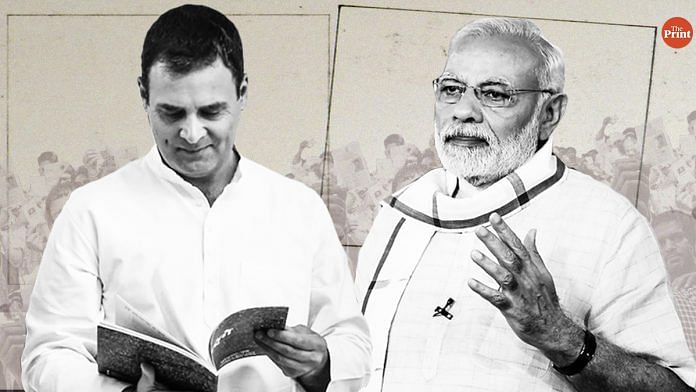As slogans like ‘Main bhi chowkidar’, ‘Modi hai toh mumkin hai’, ‘Garibi pe vaar 72 hazaar’ and ‘Chowkidar chor hai’ soar and occupy voters’ mindspace, the Congress’ manifesto for the 2019 Lok Sabha elections promised to amend AFSPA, scrap the sedition law and provide income support to the poor. PM Narendra Modi called it a ‘deception document’.
ThePrint asks: What matters more to Indian voters in elections: campaign slogans or party manifestos?
Can’t recall the last time Indians read party manifestos & voted
 Yashwant Deshmukh
Yashwant Deshmukh
Founder of C-voter and political analyst
I can’t recall the last time Indians read party manifestos and went out to vote.
Elections are generally fought on narratives and ideologies – such as national security or corruption.
Of late, there is, of course, more seriousness in drafting manifestos and that is a good thing. The more informed the people are, the more they can hold political parties accountable over their promises.
But in my 25 years in this profession, I have seen manifestos more as an extension of the party ideology, and hardly as a support to the votes.
Even this time, the impact of manifestos won’t be much because the reactions to it from other parties follow an established line of thought. The camps are already polarised. The 2019 Lok Sabha election is one of the most polarised elections – to make PM Narendra Modi win again or to defeat him. Any rhetoric, manifesto just adds to that narrative.
If NYAY has become a serious issue before the polls, it is simply because there has been a continuing debate on jobs data and unemployment.
But promising something, making it the buzzword, and having the trustworthiness to deliver on it are entirely different things. I don’t see any impact of that on the satisfaction rating of Rahul Gandhi or PM Modi.
The BJP, too, will have to come up with a more substantial response, rather than just saying that such manifestos are unfeasible.
Indian voters accept manifestos & slogans based on credibility, which is why Modi won in 2014
 Arun Anand
Arun Anand
CEO, Indraprastha Vishwa Samvad Kendra, and author of Know About RSS
For Indian voters, the manifestos and the campaign slogans may not seem to be mutually exclusive to each other; they have a cause and effect relationship.
What matters most to the Indian voters, however, is the credibility of the political parties and the leadership. For example, Narendra Modi and the BJP enjoyed a greater credibility than their rivals in the run-up to the 2014 Lok Sabha polls. People felt that Modi has delivered in Gujarat as the chief minister and so they trusted his promises and BJP’s manifesto.
And once again, it is because of the ‘credibility’ issue that the opposition has been unable to take an edge over Modi in the run-up to the 2019 general elections.
Originality is also a key factor in determining the acceptability of the manifestos. For example, the Congress manifesto for 2019 elections released on 2 April has been rejected by many as parts of it seem inspired by the manifestos of radical Left CPI(ML) and outfits like AISA.
The way the Congress has been attacking the RSS also indicates the growing influence of radical Left in the party. It should be a cause of concern for everyone and most importantly, the Congress itself as it is neither able to draft its own manifesto nor coin its own slogans.
Also read: Congress’ election manifesto is the right document at the wrong time: Yogendra Yadav
BJP rather pick holes in Congress manifesto, than talk about its own 2014 promises
 Apoorvanand
Apoorvanand
Hindi professor, Delhi University
Campaign slogans camouflage intentions and lead or mislead people in the direction that political parties want by not allowing them to ask real questions.
Manifestos are serious documents, which should be presented to the electorate. It is the platform through which parties try to mobilise majorities by offering social, political and economic ideas in a coherent manner.
But what we have seen in the past is that the manifesto that parties offer during campaign, and what they actually implement after coming to power are entirely different. This is how mandates are stolen from the electorate. It leads to the lowering of people’s faith in manifestos.
We are now witnessing a comeback of the election manifesto, propelled largely by social groups – like the LGBTQIA groups, women’s and people with disability groups – who put pressure on parties to include their demands in manifestos. What was unimaginable 10 years ago is now possible, thanks to these pressure groups. So, the electorate is interested in these documents.
Manifestos are the only tangible measure to check if governments are fulfilling promises. This is why the BJP is trying to make manifestos irrelevant. They are talking about everything except their own 2014 manifesto and how much progress they have made on the promises. The BJP would rather pick holes in the Congress manifesto.
The Congress party has very boldly talked about sedition law, AFSPA, tribal land rights in its manifesto. It is a progressive manifesto that can be debated. But the attempt to tarnish it, by calling it the work of ‘Tukde Tukde Gang’, shows that the BJP is jittery.
Poor & marginalised understand political agendas, be it through slogans or manifestos
 Manisha Priyam
Manisha Priyam
Associate Professor, National University for Educational Planning and Administration
Those who see India as a developing country with abundant poverty and illiteracy tend to characterise its democracy – wrongly so – as a patronage democracy. According to them, poor people from marginalised and downtrodden social castes are dependent on election freebies and money. Or, that they will only vote on the basis of caste and religious affiliations.
Contrary to this, the poor and marginalised understand political agendas, be it through slogans or manifestos.
While they may not understand the complicated economic numbers, they do understand the intentions of political parties and their supposedly pro-poor policies.
Manifestos are important because they allow the voter to see what political parties are offering. And, subsequently they can hold these parties accountable on their poll promises. So, delivering on promises is critical for a political party.
Also read: BJP will amplify national security rhetoric, welfare delivery to counter Congress manifesto




Everywhere in the world , there is a slowdown / recession , everybody is struggling so slowdown is better than bankruptcy ……. We HV to be very careful
All these is due to aggressive attitude of China , acquiring manufacturing businesses FM countries , creating joblessness in those countries
Then war in Muslim Countries due to which surge in refugees. Without any plan refugees are getting accepted , they r doing nothing spoiling the countries, countries identities n getting served from our tax money
So my suggestion is one shld bring in refugees only if the countries HV jobs for them, none of the refugees shld be fed on our tax money. Cos then our tax money can be used in proper developments
Jai Hind
Nothing matters more than caste and freebies in less education sections. In the more educated sections, vote is decided by personal biases. The latter phenomenon is now true even for mature democracies such as the UK and the US. Society is polarised, and the weaknesses of democracy are getting exposed. Look at China and Saudi Arabia…no manifestoes, no slogans. Take what you are given; or get lost!!
Only Freebies subsidies reservation matter to Indian voters.
English is a strange language. Why should it not be Manifestoes and Mangos …
One looks forward to a column by Ms Manisha Priyam in The Print on who is winning in Bihar.